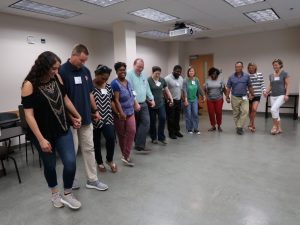K-12 Teachers Complete Year-Long Fellowship on the Middle East and Africa
January 22, 2019
Center for Middle East and Islamic Studies
In December 2018, a group of thirteen K-12 teachers completed an intensive, year-long fellowship organized by the Duke-UNC Consortium for Middle East Studies (composed of the UNC Center for Middle East and Islamic Studies and the Duke University Middle East Studies Center), UNC African Studies Center and Carolina K-12.
The Middle East and African Cultures Teacher Fellows Program was established to enhance teachers’ expertise in Middle East and African studies through trips to sites across North Carolina with connections to the regions, paired with culturally relevant resources and pedagogy. “The program also aimed to establish a strong cohort of fellows, who will continue to collaborate and serve as teacher leaders in their schools and districts upon completion of the program,” said Emma Harver, outreach coordinator for the Duke-UNC Consortium for Middle East Studies.
Participants attended a two-day orientation workshop in February 2018 at UNC-Chapel Hill to introduce the major themes of the fellowship. They then attended six site visits across North Carolina to explore Middle Eastern and African heritage, adding an experiential learning component to the program. According to fellow Jeff Crisp, a social studies teacher from Hibriten High School in Caldwell County, “the hands-on aspect of the site visits was the most valuable thing about this program. Most professional development does not allow for the contact and interaction with the food, music, people, and artifacts that this program has shown us.”

The field visits included a workshop with the Iranian Cultural Society of North Carolina in Chapel Hill, a visit to a refugee resettlement agency in Greensboro, a tour of Middle Eastern and African food establishments in Charlotte, and a performance of Sudanese music in Durham by Alsarah and The Nubatones, among others.
For Wendi Pillars, an ESL teacher at Jordan-Matthews High School in Chatham County, the fellowship changed her perspective on teaching about the regions. “I know so many more aspects of Middle Eastern and Northern African cultures now that I never would have even known to ask about.” Pillars said that the fellowship expanded her thinking and taught her nuances about culture.
This is the second long-term fellows program run by the programs at Duke and Carolina. “This is an effective model for teacher training,” said Harver. “While we have seen success with our short-term programs, we are committed to providing long-term programs that offer more sustained engagement with educators. These year-long opportunities are more effective in increasing content knowledge and supporting teachers in incorporating new material into the classroom.”
Fellows were chosen from over 65 applicants across the state, and represent urban and rural districts, different grade levels, and various subject areas.
As part of their commitment to the program, the fellows created lesson plans and classroom activities with content on the Middle East and Africa that will be shared with teachers around the state, broadening the impact of the program.
“The thematic, long-term nature of the teacher fellows program sets it apart from other professional development opportunities,” said Erica Luetzow, a cultural studies teacher at Club Boulevard Elementary School. “You really have the time to slow down, focus on topics, and actually increase your own academic knowledge.”
View a video about the Middle East and African Cultures Teacher Fellows Program here.
The program was supported by the UNC College of Arts & Sciences, Carolina K-12’s Warren A. Nord Endowment for Teachers, and Title VI funding from the U.S. Department of Education, made available to the Duke-UNC Consortium for Middle East Studies and UNC African Studies Center through their designation as National Resource Centers.
